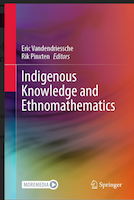Eric Vandendriessche, Rik Pinxten, (Eds)
Highlights the use of ethnographic data in sophisticated educational processes in mathematics
Offers insights from a ‘second generation’ of ethnomathematics studies“
“The book presents a series of ethnographic studies, which illustrate issues of wider importance, such as the role of cultural traditions, concepts and learning procedures in the development of formal (or mathematical) thinking outside of the western tradition. It focuses on research at the crossroads of anthropology and ethnomathematics to document indigenous mathematical knowledge and its inclusion in specific cultural patterns. More generally, the book demonstrates the heuristic value of crossing ethnographical, anthropological and ethnomathematical approaches to highlight and analyze—or "formalize" with a pedagogical outlook—indigenous mathematical knowledge.
The book is divided into three parts. The first part extensively analyzes theoretical claims using particular ethnographic data, while revealing the structural mathematical features of different ludic, graphic, or technical/procedural practices in their links to other cultural phenomena. In the second part, new empirical studies that add data and perspectives from the body of studies on indigenous knowledge systems to the ongoing discussions in mathematics education in and for diverse cultural traditions are presented. This part considers, on the one hand, the Brazilian work in this field; on the other hand, it brings ethnographic innovation from other parts of the world. The third part comprises a broad philosophical discussion of the impact of intuitive or "ontological" premises on mathematical thinking and education in the light of recent developments within so-called indigenously inspired thinking. Finally, the editors’ conclusions aim to invite the broad and diversified field of scholars in this domain of research to seek alternative approaches for understanding mathematical reasoning and the adjacent adequate educational goals and means.
This book is of interest to scholars and students in anthropology, ethnomathematics, history and philosophy of science, mathematics, and mathematics education, as well as other individuals interested in these topics.”
Editors and Affiliations
National Centre for Scientific Research, Paris, France : Eric Vandendriessche
Cultures and Languages, Ghent University, Ghent, Belgium : Rik Pinxten
TABLE OF CONTENTS
Front Matter, p. i-xiv [pdf]
Ethnography and Mathematics
- Front matter, p. 1-1 [pdf]
- Re/Creating ‘Evocative Images’ (sunannguanik iqqaigutinik): Procedural Knowledge and the Art of Memory in the Inuit Practice of String Figure-Making, p. 3-37 [abstract]
Céline Petit
- Modeling of Implied Strategies of Solo Expert Players, p. 39-83 [abstract]
Luc Tiennot
- Sand Drawing Versus String Figure-Making: Geometric and Algorithmic Practices in Northern Ambrym, Vanuatu, p. 85-118 [abstract]
Eric Vandendriessche
Impact of Indigenous Culture on Education in General, and on Mathematics Classes in Particular
- Front matter, p. 119 [pdf]
- Indigenous School Education: Brazilian Policies and the Implementation in Teacher Education, p. 121-139 [abstract]
Sérgia Oliveira, Liliane Carvalho, Carlos Monteiro, Karen François
- Indigenous Mathematical Knowledge and Practices: State of the Art of the Ethnomathematics Brazilian Congresses (2000–2016), p. 141-160 [abstract]
Maria Cecilia Fantinato, Kécio Gonçalves Leite
- Subverting Epistemicide Through ‘the Commons’: Mathematics as Re/making Space and Time for Learning, p. 161-179 [abstract]
Anna Chronaki, Eirini Lazaridou
Meta-studies
- Front matter, p. 181 [pdf]
- The Tapestry of Mathematics —Connecting Threads: A Case Study Incorporating Ecologies, Languages and Mathematical Systems of Papua New Guinea, p. 183-220 [abstract]
Kay Owens
- Indigenous Mathematics in the Amazon: Kinship as Algebra and Geometry Among the Cashinahua, p. 221-242 [abstract]
Mauro W. B. Almeida
- The Western Mathematic and the Ontological Turn: Ethnomathematics and Cosmotechnics for the Pluriverse, p. 243-276 [abstract]
Michael Baker
Back Matter
Pages 277-285 [pdf]
About the editors
Eric Vandendriessche is an ethnomathematician, researcher at the French National Centre for Scientific Research (CNRS), member of the Science, Philosophy, History laboratory (CNRS & University of Paris). He has published ethnomathematical research aiming at studying the mathematical character of different technical/procedural activities (string figure-making, sand drawing, mat making) as they are practiced in Melanesian societies. He has also published historiographical research. Recently, he coordinated the “Encoding and Transmitting Knowledge with a String: a comparative study of the cultural uses of mathematical practices in string figure-making (Oceania, North & South America)” (ETKnoS, 2016-2021) research project, supported by the French National Research Agency (ANR).
Rik Pinxten has worked as an anthropologist with the Navajo Indians of Arizona/New Mexico in the USA, on spatial knowledge in the language and in cultural practices. He developed a Navajo curriculum book for geometry teaching in primary school. With thoroughly comparative work on knowledge and studies in ethnomathematics, he has produced a synthesis on the use of anthropological studies in mathematics education. He has also published on epistemology and anthropology of knowledge. He is an activist and an academic.
:: Springer Cham
:: 15 February 2023
:: DOI https://doi.org/10.1007/978-3-030-97482-4
:: Hardcover ISBN978-3-030-97481-7 / Softcover ISBN978-3-030-97484-8 / eBook ISBN978-3-030-97482-4
:: Edition Number1
:: Number of PagesXIV, 285 / Number of Illustrations39 b/w illustrations, 70 illustrations in colour




